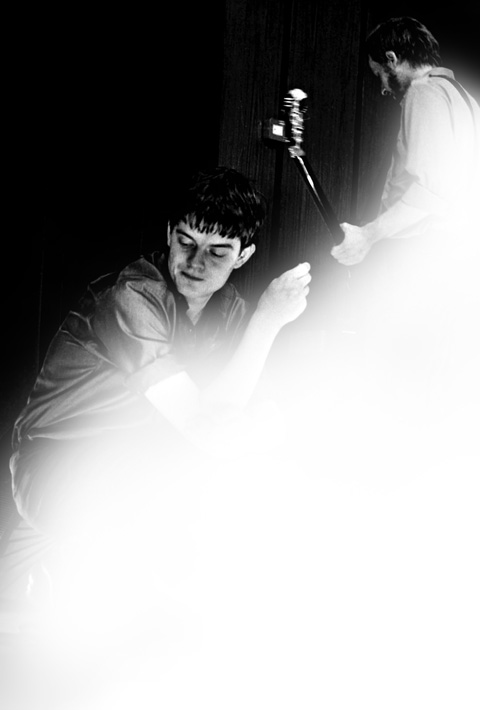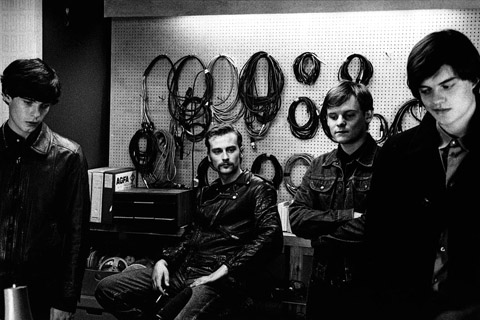Biopics have a patchy track record at best, and rock star biopics are a killing field strewn with the dismembered bodies of dreams that could never live up to the light of narrative storytelling. Joy Division is an exception in that it has been central to two towering achievements of rock music cinema, the first as a supporting part in Michael Winterbottom’s 2002 24 Hour Party People and more recently as the subject of Anton Corbijn’s Control (2007), which has just hit the screens in Taipei.
It’s a remarkable work of psychological and social exploration, subtle, understated and affecting, even for those for whom the post-punk Manchester music scene is a matter of complete indifference. It’s as much about a man, Ian Curtis, the lead singer of Joy Division whose suicide at age 23 was a shattering experience for fans of a band that was just about to be launched into the stratospheric heights of international rock stardom. Curtis is played with enormous conviction by Sam Riley, who also performs the vocals from the Joy Division repertoire, a move which gives the performance sequences an immediacy and conviction, ironically absent from such productions as La Vie en Rose (2007), in which the lovely Marion Cotillard lip-synced to original Edith Piaf vocals.
Shot in gritty black and white, the world of the Manchester music revolution as seen by Ian Curtis is a very different place from the more colorful if equally manic and dysfunctional one revealed by music impresario Tony Wilson, from whose perspective 24 Hour Party People is shot. The two films would make a wonderful double bill, both portraying the rough and tumble of the music industry with a clear eye for the magical way in which it can sometimes give expression to inarticulable angst and frustration, and the way this is cynically manipulated. Control, whose director Anton Corbijin was instrumental in creating the image of Curtis and Joy Division as a photographer and was personally acquainted with the subject, has an intimacy that is very much in contrast to American mainstream features such as the Ray Charles biopic Ray (2004) or the Johnny Cash biopic Walk the Line (2005).

Control is far too deeply rooted in the familiar agonies of early adolescence and young manhood and the deep malaise of a big industrial city to allow any expectations of a fairy-tale ending or even redemption, and Curtis’ character is drawn to exactly human proportions. Neither his talent nor the obstacles in his path are ever portrayed as anything extraordinary — despite his voice, his magnetic stage presence, his job at the local job center, his epilepsy, his one tragic romance, he is an ordinary bloke trying to do the right thing.
And in any case, it’s taken for granted that everyone knows the tragic ending, so the director can focus on the performances. Samantha Morton, who plays Ian Curtis’ teenage wife, puts in a massive performance and anchors the film in the practicalities of lower-middle class English life. The ensemble playing band members such as Peter Hook (Joe Anderson), manager Rob Gretton (Toby Kebbell) and Tony Wilson (Craig Parkinson) creates a world that is both cutting edge and down at heel. There are moments of great humor, largely realized in Kebbell’s character, and the relationship between Annik Honore and Curtis is full of innocence and discovery.
Even if you don’t love Joy Division’s music, Control is worth watching simply for its evocation of 1970s Manchester and the study of a decent young man who married his teenage sweetheart, became famous, found a deeper and more satisfying love with another woman and decided that the only way out was to die — oblivious to the fact that everything he had ever dreamed of lay just days away with the beginning of Joy Division’s first US tour. It is a clear-eyed view of life, and remarkably free of moral uplift. In its dark tones and ambiguity, it does justice to the music of Joy Division.



Beijing’s ironic, abusive tantrums aimed at Japan since Japanese Prime Minister Sanae Takaichi publicly stated that a Taiwan contingency would be an existential crisis for Japan, have revealed for all the world to see that the People’s Republic of China (PRC) lusts after Okinawa. We all owe Takaichi a debt of thanks for getting the PRC to make that public. The PRC and its netizens, taking their cue from the Chinese Communist Party (CCP), are presenting Okinawa by mirroring the claims about Taiwan. Official PRC propaganda organs began to wax lyrical about Okinawa’s “unsettled status” beginning last month. A Global

Taiwan’s democracy is at risk. Be very alarmed. This is not a drill. The current constitutional crisis progressed slowly, then suddenly. Political tensions, partisan hostility and emotions are all running high right when cool heads and calm negotiation are most needed. Oxford defines brinkmanship as: “The art or practice of pursuing a dangerous policy to the limits of safety before stopping, especially in politics.” It says the term comes from a quote from a 1956 Cold War interview with then-American Secretary of State John Foster Dulles, when he said: ‘The ability to get to the verge without getting into the war is

Dec. 22 to Dec. 28 About 200 years ago, a Taoist statue drifted down the Guizikeng River (貴子坑) and was retrieved by a resident of the Indigenous settlement of Kipatauw. Decades later, in the late 1800s, it’s said that a descendant of the original caretaker suddenly entered into a trance and identified the statue as a Wangye (Royal Lord) deity surnamed Chi (池府王爺). Lord Chi is widely revered across Taiwan for his healing powers, and following this revelation, some members of the Pan (潘) family began worshipping the deity. The century that followed was marked by repeated forced displacement and marginalization of

Music played in a wedding hall in western Japan as Yurina Noguchi, wearing a white gown and tiara, dabbed away tears, taking in the words of her husband-to-be: an AI-generated persona gazing out from a smartphone screen. “At first, Klaus was just someone to talk with, but we gradually became closer,” said the 32-year-old call center operator, referring to the artificial intelligence persona. “I started to have feelings for Klaus. We started dating and after a while he proposed to me. I accepted, and now we’re a couple.” Many in Japan, the birthplace of anime, have shown extreme devotion to fictional characters and